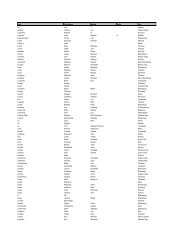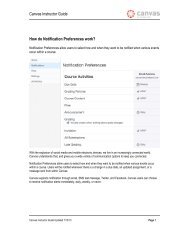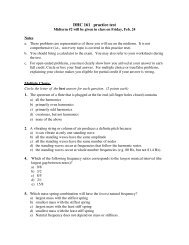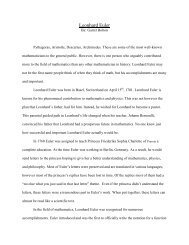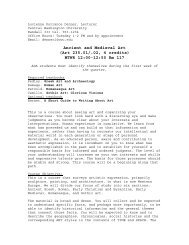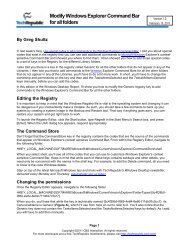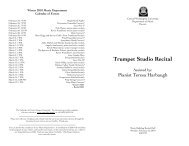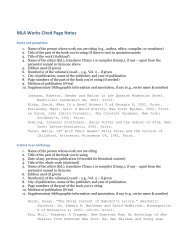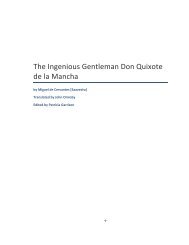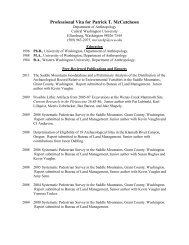THE COURAGE OF TURTLES - Central Washington University
THE COURAGE OF TURTLES - Central Washington University
THE COURAGE OF TURTLES - Central Washington University
You also want an ePaper? Increase the reach of your titles
YUMPU automatically turns print PDFs into web optimized ePapers that Google loves.
Orwell 9<br />
Professor Lancelot Hogben (Interglossa)<br />
On the one side we have the free personality: by definition it is not neurotic, for it<br />
has neither conflict nor dream. Its desires, such as they are, are transparent, for<br />
they are just what institutional approval keeps in the forefront of consciousness;<br />
another institutional pattern would alter their number and intensity; there is<br />
little in them that is natural, irreducible, or culturally dangerous. But on the other<br />
side, the social bond itself is nothing but the mutual reflection of these self-secure<br />
integrities. Recall the definition of love. Is not this the very picture of a small<br />
academic? Where is there a place in this hall of mirrors for either personality or<br />
fraternity?<br />
Essay on psychology in Politics (New York)<br />
All the "best people" from the gentlemen's clubs, and all the frantic fascist<br />
captains, united in common hatred of Socialism and bestial horror of the rising<br />
tide of the mass revolutionary movement, have turned to acts of provocation, to<br />
foul incendiarism, to medieval legends of poisoned wells, to legalize their own<br />
destruction of proletarian organizations, and rouse the agitated petty-bourgeoisie<br />
to chauvinistic fervor on behalf of the fight against the revolutionary way out of<br />
the crisis.<br />
Communist pamphlet<br />
If a new spirit is to be infused into this old country, there is one thorny and<br />
contentious reform which must be tackled, and that is the humanization and<br />
galvanization of the B.B.C. Timidity here will bespeak canker and atrophy of the<br />
soul. The heart of Britain may be sound and of strong beat, for instance, but the<br />
British lion's roar at present is like that of Bottom in Shakespeare's Midsummer<br />
Night's Dream—as gentle as any sucking dove. A virile new Britain cannot<br />
continue indefinitely to be traduced in the eyes or rather ears, of the world by the<br />
effete languors of Langham Place, brazenly masquerading as "standard English."<br />
When the Voice of Britain is heard at nine o'clock, better far and infinitely less<br />
ludicrous to hear aitches honestly dropped than the present priggish, inflated,<br />
inhibited, schoolma'amish arch braying of blameless bashful mewing maidens!<br />
Letter in Tribune<br />
Each of these passages has faults of its own, but, quite apart from avoidable<br />
ugliness, two qualities are common to all of them. The first is staleness of imagery; the<br />
other is lack of precision. The writer either has a meaning and cannot express it, or he<br />
inadvertently says something else, or he is almost indifferent as to whether his words<br />
mean anything or not. This mixture of vagueness and sheer incompetence is the most<br />
marked characteristic of modern English prose, and especially of any kind of political<br />
writing. As soon as certain topics are raised, the concrete melts into the abstract and no



